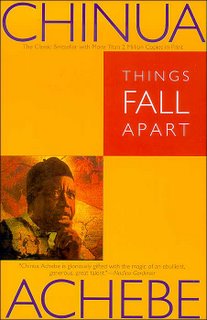Things Fall Apart –As The Title Say
After reading Things Fall Apart by Chinua Achebe, I finally understand the core meaning of the title. Throughout the story, the author had rounded through small and large conflicts faced by Okonkwo and his clan. Okonkwo’s world was always unstable, going back and forth from being well and unwell. These situations happen in both Okonkwo’s internal and external relationship. His internal relationship is specifically the relationship between him and Nwoye, though from the start, it was unstable to begin with, and things finally fell apart for them after Okonkwo killed Ikemefuna. As for his clan, when the “white men” established their church in their village area, they influenced the people. Soon afterwards, the white men have brought their government rule upon the people, who eventually lose their traditional customs and beliefs. It’s rather upsetting to see how everything around Okonkwo, from his private family affairs to his public affairs, breaks down. Like a bridge that once stood firm, it is eroded by time and weather, and will eventually fall apart.






